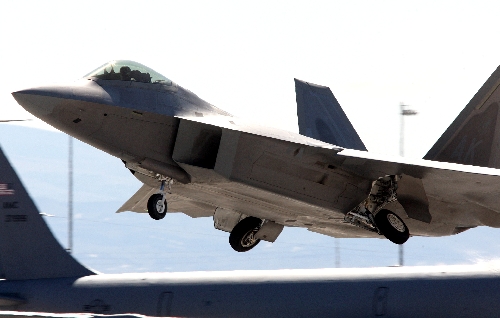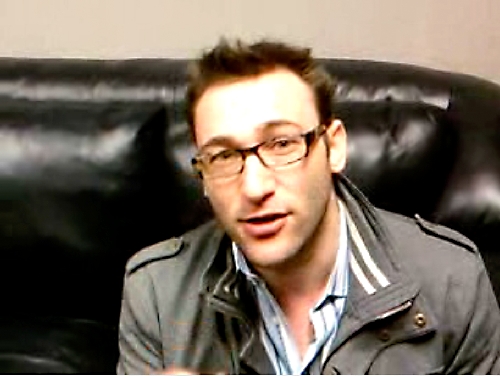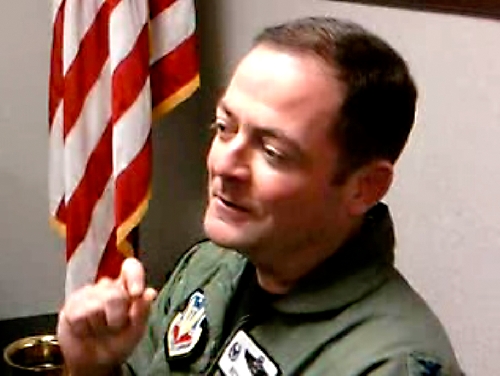Air Force helping hone new corps of leaders



While warplanes took off for another round of Red Flag air combat training at Nellis Air Force Base this week, next-generation leaders were being schooled in a building not far from the flight line.
They were there to learn a new spin on an old philosophy on how to improve what they do.
"I told the guys, it’s not enough any more to be ace of the base," said Col. Richard "Tex" Coe, commandant of the United States Air Force Weapons School. "We have to bring others with us.
"It’s an old philosophy to train tactical leaders to make the next generation Air Force better than where we are today. We’re just re-emphasizing it because it’s more important than ever."
The new spin comes from Simon Sinek, a marketing consultant, motivational speaker and author of the book, "Start with Why: How Great Leaders Inspire Everyone to Take Action."
"Every single organization on the planet, even our own careers, are functions of three levels: What we do, how we do it, and why we do it," Sinek explained before addressing the first of two classes of 110 officers each who were selected for graduate training for pilots, intelligence officers and other leaders.
The "why" question is what needs more focus, Sinek said.
"Why we do it, the purpose or cause why we come to work, why our organizations exist is very often left unsaid," he said. "What I’m interested in is loyalty. What I’m interested in is what inspires people. What I’m interested in is what gets people up every single day to do something, maybe pay a premium, maybe suffer inconvenience, maybe sacrifice because they’re driven by something else. What is that thing?
"What I’ve learned is it’s that question, why. It has a biological imperative, it drives us, it inspires us."
He cited examples of great leaders, from the geniuses behind computer technology to the Rev. Martin Luther King Jr., or "those with the capacity to inspire those around them."
"Every single one of them — regardless of what they do and how they do it — every single one of them is perfectly clear on why they do what they do, and more importantly they start with ‘why,’" Sinek said.
Coe believes the school’s new leadership curriculum will translate to success in the global war on terrorism, particularly in the fight in Afghanistan.
"What we’re going to be doing is purposely developing these innovative and creative leaders that will go out there and face problems," Coe said.
"We don’t even know our problems yet, and we’ll be able to put our pieces together and use resources and other people around us to get the mission accomplished."
Coe, a master navigator with more than 3,000 flight hours including 460 combat hours, left Afghanistan in 2002. Today, the country "is a new and different place" he said.
"It’s a completely different problem than it was back then. It’s ever changing, and we’re preparing them for that ever-changing problem."
Specifically, the war in Afghanistan in 2002 was a more kinetic type than it is nine years later.
"Now it’s more non-kinetic and we’re trying to integrate how we’re going to get everything from building schools to clear, hold and build," he said.
Sinek looked in the rear-view mirror of time to understand the roots and philosophy behind the weapons school. The school was founded after World War II to apply lessons learned from the Army Air Corps experience in hopes to reduce the astronomically high rate of airmen casualties in the future.
In some bombing raids, it was normal that 80 percent of the aircraft wouldn’t make it back home, he noted.
"Just what the colonel was saying about what we’re experiencing in Afghanistan, even over the course of a few years how it changes significantly," Sinek said.
Sinek outlined the reason he was chosen to help launch the new leadership course: "We understand that beyond equipment and beyond tactics and beyond strategy, at the end of the day that equipment doesn’t perform without people and those machines don’t get into the sky without people, and those machines aren’t motivated and inspired without people.
"This is an organization of people, not stuff."
Contact reporter Keith Rogers at krogers@reviewjournal.com or 702-383-0308.












